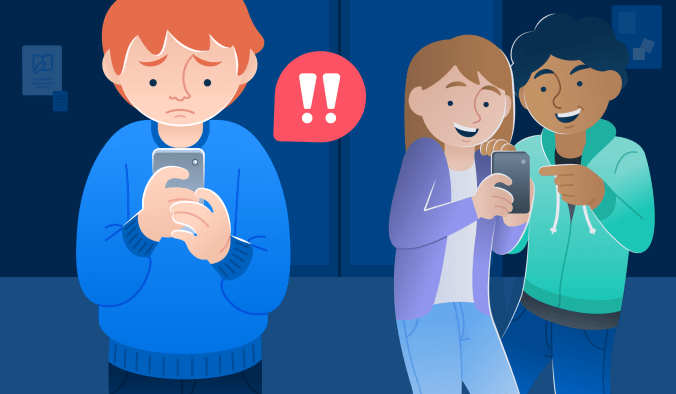Digital transformation, the advent of EdTech, has taken a toll on children. The increased access to technology, social media, and insufficient awareness and preventive measures has paved the way for the growth of cyberbullying in India.
Advertisements

Peer pressure, parental pressure, study stress, body image, and self-esteem issues add to the problem of cyberbullying.
But what is cyberbullying, and how does it affect teens?
 Lavitha Periera, Advocate of Cybersafety – Rooting You, defines “Cyberbullying – an intentional act meant to hurt or humiliate someone – is the repeated and intentional use of digital platforms such as social media, messaging apps, email, forums, and online games to harass, embarrass, or threaten someone.”
Lavitha Periera, Advocate of Cybersafety – Rooting You, defines “Cyberbullying – an intentional act meant to hurt or humiliate someone – is the repeated and intentional use of digital platforms such as social media, messaging apps, email, forums, and online games to harass, embarrass, or threaten someone.”
 Nirali Bhatia, Cyber Psychologist & Psychotherapist, Founder of CyberBAAP (an anti-cyberbullying organization), explains that the effects of cyberbullying are omnipresent. It is always there to haunt a child. So, while the impact of bullying can be treated with proper counselling, it is difficult to write the slate clean with cyberbullying.
Nirali Bhatia, Cyber Psychologist & Psychotherapist, Founder of CyberBAAP (an anti-cyberbullying organization), explains that the effects of cyberbullying are omnipresent. It is always there to haunt a child. So, while the impact of bullying can be treated with proper counselling, it is difficult to write the slate clean with cyberbullying.
 To understand the psychological effects of cyberbullying in children, empathetic communication is important, says Swapna Nair, Counsellor/Transformation Coach.
To understand the psychological effects of cyberbullying in children, empathetic communication is important, says Swapna Nair, Counsellor/Transformation Coach.
Empathetic communication is crucial for a child to share their thoughts and feelings without fear of being punished or judged. And for that, parental support is vital.
How To Recognize The Signs of Cyberbullying in Your Friends and Siblings?
Teens are one of the most difficult stages in the human lifecycle. They are going through a lot in the name of growth and development. This is the age when a child is most sensitive about their looks and appearance.
This is the age when the mirror becomes a friend. Appreciating themselves or criticizing themselves for their minor flaws is quite common.
However, with some effort, you can recognize the signs of cyberbullying in your friend, sibling, or even your child.
Parenting Coaches, Dr. Sonam Mahajan, and Lavina Pandit share some signs to watch out for.
- There is a sudden withdrawal from devices or social media.
- There is a rise in anxiety, mood swings, or irritability, especially after screentime.
- They refuse to go to school or even meet friends.
- There is a decline in their academic performance.
- Lack of hunger or sleep is another sign you may watch out for in your friends, siblings, or your child.
- The child also displays aggression at school and at home.


If you notice these signs in your friends, siblings, or your child:
Take them into your confidence and have an open communication with them.
Use all your previous interactions with your child as a base and build new relationship with them based on those interactions.
Your child may want to shut you out. It is okay. Let them have their time but at the same time let them know that you are their safe place and they could come and talk to you.








 Lavitha Periera, Advocate of Cybersafety – Rooting You, defines “Cyberbullying – an intentional act meant to hurt or humiliate someone – is the repeated and intentional use of digital platforms such as social media, messaging apps, email, forums, and online games to harass, embarrass, or threaten someone.”
Lavitha Periera, Advocate of Cybersafety – Rooting You, defines “Cyberbullying – an intentional act meant to hurt or humiliate someone – is the repeated and intentional use of digital platforms such as social media, messaging apps, email, forums, and online games to harass, embarrass, or threaten someone.” Nirali Bhatia, Cyber Psychologist & Psychotherapist, Founder of CyberBAAP (an anti-cyberbullying organization), explains that the effects of cyberbullying are omnipresent. It is always there to haunt a child. So, while the impact of bullying can be treated with proper counselling, it is difficult to write the slate clean with cyberbullying.
Nirali Bhatia, Cyber Psychologist & Psychotherapist, Founder of CyberBAAP (an anti-cyberbullying organization), explains that the effects of cyberbullying are omnipresent. It is always there to haunt a child. So, while the impact of bullying can be treated with proper counselling, it is difficult to write the slate clean with cyberbullying. To understand the psychological effects of cyberbullying in children, empathetic communication is important, says Swapna Nair, Counsellor/Transformation Coach.
To understand the psychological effects of cyberbullying in children, empathetic communication is important, says Swapna Nair, Counsellor/Transformation Coach.






